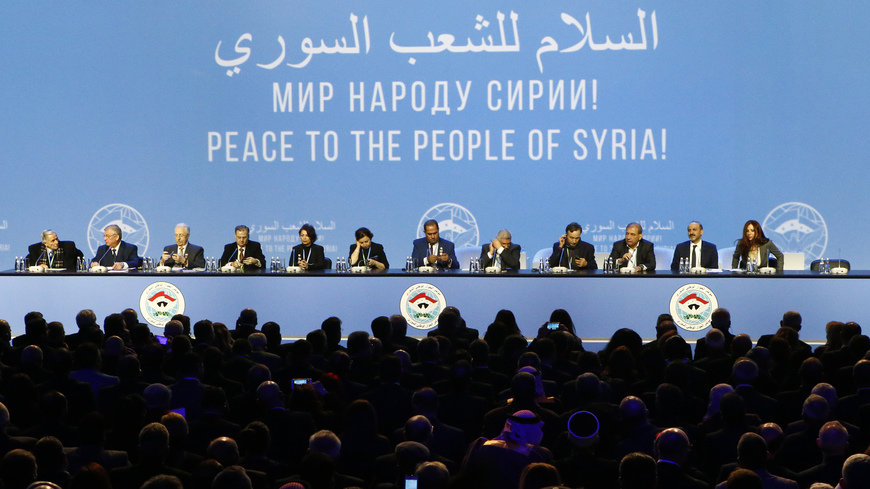Sochi summit helping solve the Syrian crisis

TEHRAN - Last Tuesday, the Syrian Peace Summit, called the "National Dialogue Congress", was held in Sochi, Russia, with different groups of participants including members of the Bashar al-Assad’s administration, its supporters and some opposition groups.
Russia initiated the summit and received support from the Islamic Republic of Iran and Turkey. The talks aimed to foster peace with direct dialogue between the Syrian government and its opponents. Russia invited 1,600 politicians and political activists to the conference, but for various reasons only about 350 people showed up.
Opponents of the Syrian government interrupted the opening speech by the Russian Foreign Minister Sergei Lavrov, who said that Russian President Vladimir Putin also supported the United Nations peace talks.
Many Syrian opponents, as well as Western countries, were skeptical about Russia's intentions and purposes at Sochi. They believe Putin's goal is to create a post-war structure in Syria to promote the continuation of the presidency of Bashar al-Assad. This is fundamentally different from the goals of the anti-Syrian Front, which initially sought to reform the existing structure and overthrow Assad.
In response to the Sochi Summit, the US claimed the conference was unilateral and designed to benefit the Syrian regime solely. Subsequently, charges were brought against the Syrian government, such as the use of chemical weapons. A spokesman for the U.S. also blamed Russia, while Kurds and secular forces fighting with Turkey's government boycotted Sochi. The main reason for the Kurds' lack of participation in this conference was Turkey's attack on Afrin in northern Syria and the suppression of the Kurds. Russia was apparently silent on this issue.
The Kremlin spokesman said that perhaps little could be expected from the Sochi conference. However, the meeting ended with a final statement.
The presidents of the Islamic Republic of Iran, Russia and Turkey issued a joint statement reaffirming the sovereignty, independence and territorial integrity of Syria, and agreed to continue to work together until the final defeat of the terrorist groups.
The leaders said that after years of international efforts by the UN Security Council to defeat the terrorist groups in Syria, 11 months after the establishment of an incomplete ceasefire in late 2016, ISIS had been mostly hobbled along with the al-Nusra Front and other terrorist organizations designated by the United Nations Security Council.
They agreed to help Syrians unify and restore their country with a political solution to the crisis through a comprehensive, free, fair and transparent process that leads to a new constitution under the proper supervision of the United Nations based on UN Security Council Resolution 2254.
The Presidents stressed the need for quick, safe and unhindered access to humanitarian aid, too, as well as the need for confidence building measures from the Syrian parties, including the release of detainees and the delivery of bodies, including identification of the missing, to create better grounds for the political process and a durable ceasefire. They urged the members of the international community to support the process of reducing tension and stabilizing in Syria, and asked for more assistance from the Syrian people. Demining, the preservation of Syria’s historical heritage, and reconstruction of basic infrastructure both economic and social were also cited as important goals.
Along with the final statement covering the core issues for the benefit of Syria and its people, the United Nations approval, and the presence of Staffan De Mistura, the UN special envoy to the Syrian peace talks, helped make the Sochi talks productive.
While the West boycotted the Sochi Summit, De Mistura's presence in it had a special meaning. De Mistura said he hopes that the meeting will be the basis for further negotiations in Geneva, and will pave the way for finding a lasting solution to the Syrian crisis.
The Sochi talks did cast a shadow over the Washington Group document. The United States, Britain, France, Saudi Arabia and Jordan, called the "Washington Group", recently issued a document to resolve the Syrian crisis. The dossier is clearly an indicator of the apparent interference of these states in Syria's internal affairs. But the Sochi Summit is in fact an attempt to bring all the Syrian disputants together with the purpose of determining this country's political future by the Syrian people, which is in perfect harmony with international documents and laws, including the United Nations Security Council Resolution 2254.
In the end, the summit did reveal the ongoing discord between the opposition groups and the Syrian government, as well as the internal disputes between the opponents of Assad's administration. The intense competition between foreign players was remarkable in the meeting. Given the existing complexities and differences, much cannot be expected of the Sochi Summit. But this conference can be regarded as an important step forward in attempts to settle the basic issues of the post-war Syria.
